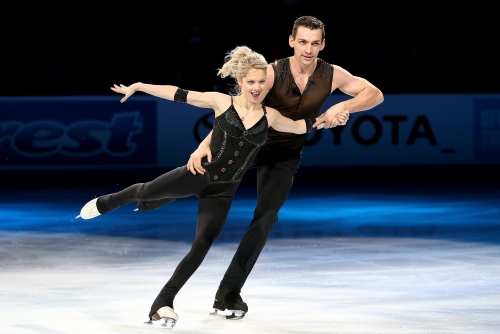Effective Leadership: Who has seen more in your ability to succeed than you did?

Like a sports coach, effective leadership is knowing how to help people find the drive and purpose within themselves to go further and make the next big leap
American pair skater Alexa Scimeca Knierim, who competed on the ice in the 2018 PyeongChang Olympics with her husband and partner Chris Knierim, recently shared that the couple wouldn’t be where they are today without their coach, Dalilah Sappenfield:
“She changed me to be the athlete I dreamed about being before I moved to her. She got a handle on my mentality and was able to use the best qualities of myself in training. Doing so, she helped me reach a lot of goals that I had wanted to.”
Reading that, it’s easy to see why people often compare coaching in sports with coaching in the workplace. It also shows that the parallels go beyond just the training, guidance and encouragement a coach provides. It’s just as much about a coach’s understanding of the mental game and how to help that individual achieve — and often broaden — what they see as possible for themselves.
Coaching’s Role in Effective Leadership
Lou Cimini, Samsonite’s Vice President of Human Resources, has shared their approach to workplace coaching and his perspective on coaching as a leadership and management priority. Samsonite, like many organizations, went through a number of changes during and immediately following the recession, and while those strategic decisions led to great success for the company, Cimini says they also brought several leadership challenges to the forefront.
For one, many leaders were taking over functions that they didn’t necessarily have experience or depth of knowledge in, while others were coming into the organization “new” due to acquisitions. As Cimini told us, the leaders needed to be able to have more effective conversations with their employees to get consistent results, and, from a cultural standpoint, there needed to be a single unifying concept of leadership.
At the same time, the company was focusing on building its agility to keep pace with a fast-moving marketplace where all eyes have to be on the next trend or customer demand. The problem is, you can’t move quickly and adapt on the fly when employees are always looking to their boss for the answers. The people on the front lines need to be empowered to solve problems, and that requires a different level of confidence — not to mention a willingness and the tools to do it.
For Cimini and his team, developing leaders’ coaching mindset and skills was the logical next step. Not only would it help everyone get on the same page from a cultural standpoint, it would, as he told us, help leaders maximize the output from their interactions with their employees. Simply put, “Coaching creates an environment where employees understand and accept the mission and are capable of carrying it out,” he says.
Here again, the similarities to sports are striking. Just ask the NFL’s Los Angeles Rams players, who entered the 2017 season on the heels of ten consecutive losing seasons. They quickly discovered what a difference a great coach can make. Sean McVay was met with skeptics for being the youngest head coach in modern NFL history (and younger than several of his own players), but a year later was being called the NFL equivalent of a miracle worker, coaching the Rams not just to a winning season but to the top of their division for the first time in fourteen years.
What are some of McVay’s secrets? He came to the team with a clear vision but, as Alden Gonzalez of ESPN noted, “he was able to integrate it with the best of what the organization already had.” Gonzalez continues:
He took control, but he empowered others. He pushed his players, but not harder than he pushed himself. He communicated his message, but he also listened. He built a following, but he never demanded it. He set the standard, but he put the onus on others to uphold it.
Sounds like the description of a pretty great leader, doesn’t it? It’s also a leader that was named 2017 NFL Coach of the Year and had his team playing in the Super Bowl a year later.

The Power of Having Great Coaching in Your Corner
In the workplace, leaders who coach effectively work together with their employees on developing a common path to results with agreed-upon outcomes along the way, and that makes it a collaborative process, rather than a command-and-control situation. They also make sure employees have the tools and the permission to take ownership of issues — whether that means solving the problem independently, forming a team to figure it out, or bringing potential solutions to the manager.
Just as important, a coaching mindset gives leaders the confidence and competency to have positive, meaningful conversations that go deeper than just executing on the tactics and techniques of the job. Like a sports coach, effective leaders know how to help people find the drive and purpose within themselves to go further and make the next big leap — or triple Salchow.
It’s an experience that Alexa Scimeca Knierim knows all too well. She had a long road back to championship form after a debilitating illness and setbacks got in the way, leading the pair to withdraw early from the U.S. championships last January because they didn’t feel fully prepared to compete. Lucky for her, she had a strong coach in her corner as she and Chris made their comeback at the Four Continents Championships and then the World Championships, where they skated away with one of the highest pairs scores in American history.
Sappenfield says, “I reminded her, ‘Do you remember where you were three months ago?’”
And look at where she is today.
It’s not just on athletic fields or in Olympic arenas where coaches can make a huge difference. It happens in workplaces every day. It may have happened to you. And maybe you’ll be that coach for someone one day, too.

Master Facilitator
Related Blog Posts



